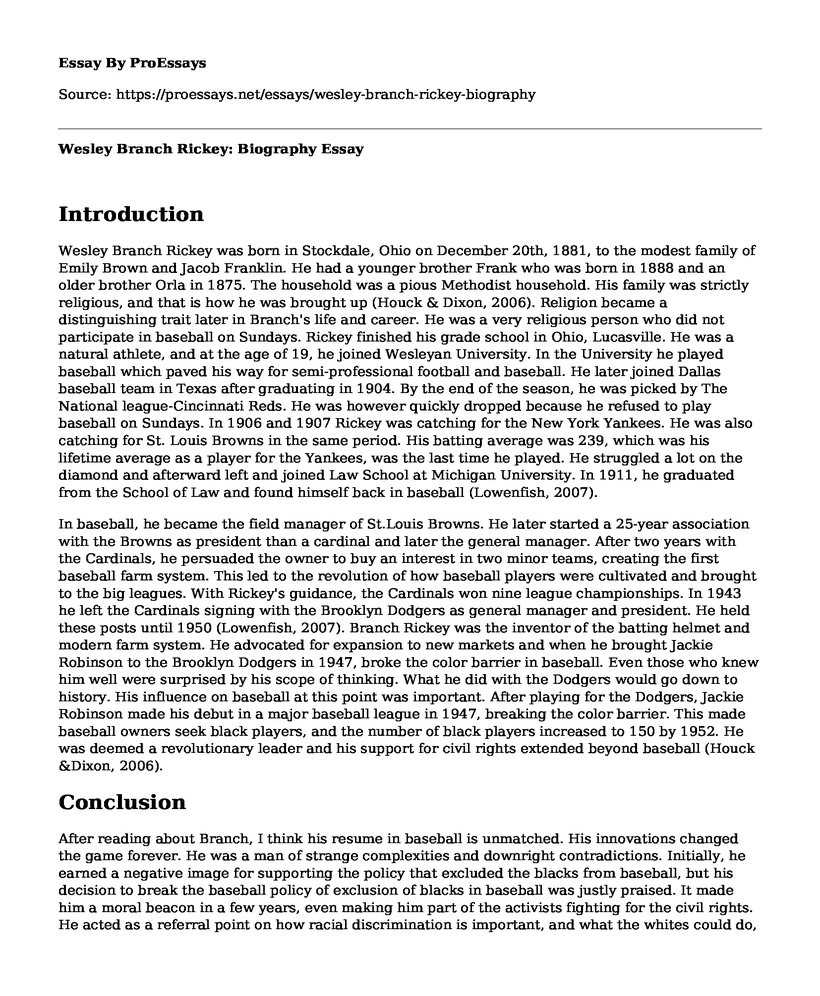Introduction
Wesley Branch Rickey was born in Stockdale, Ohio on December 20th, 1881, to the modest family of Emily Brown and Jacob Franklin. He had a younger brother Frank who was born in 1888 and an older brother Orla in 1875. The household was a pious Methodist household. His family was strictly religious, and that is how he was brought up (Houck & Dixon, 2006). Religion became a distinguishing trait later in Branch's life and career. He was a very religious person who did not participate in baseball on Sundays. Rickey finished his grade school in Ohio, Lucasville. He was a natural athlete, and at the age of 19, he joined Wesleyan University. In the University he played baseball which paved his way for semi-professional football and baseball. He later joined Dallas baseball team in Texas after graduating in 1904. By the end of the season, he was picked by The National league-Cincinnati Reds. He was however quickly dropped because he refused to play baseball on Sundays. In 1906 and 1907 Rickey was catching for the New York Yankees. He was also catching for St. Louis Browns in the same period. His batting average was 239, which was his lifetime average as a player for the Yankees, was the last time he played. He struggled a lot on the diamond and afterward left and joined Law School at Michigan University. In 1911, he graduated from the School of Law and found himself back in baseball (Lowenfish, 2007).
In baseball, he became the field manager of St.Louis Browns. He later started a 25-year association with the Browns as president than a cardinal and later the general manager. After two years with the Cardinals, he persuaded the owner to buy an interest in two minor teams, creating the first baseball farm system. This led to the revolution of how baseball players were cultivated and brought to the big leagues. With Rickey's guidance, the Cardinals won nine league championships. In 1943 he left the Cardinals signing with the Brooklyn Dodgers as general manager and president. He held these posts until 1950 (Lowenfish, 2007). Branch Rickey was the inventor of the batting helmet and modern farm system. He advocated for expansion to new markets and when he brought Jackie Robinson to the Brooklyn Dodgers in 1947, broke the color barrier in baseball. Even those who knew him well were surprised by his scope of thinking. What he did with the Dodgers would go down to history. His influence on baseball at this point was important. After playing for the Dodgers, Jackie Robinson made his debut in a major baseball league in 1947, breaking the color barrier. This made baseball owners seek black players, and the number of black players increased to 150 by 1952. He was deemed a revolutionary leader and his support for civil rights extended beyond baseball (Houck &Dixon, 2006).
Conclusion
After reading about Branch, I think his resume in baseball is unmatched. His innovations changed the game forever. He was a man of strange complexities and downright contradictions. Initially, he earned a negative image for supporting the policy that excluded the blacks from baseball, but his decision to break the baseball policy of exclusion of blacks in baseball was justly praised. It made him a moral beacon in a few years, even making him part of the activists fighting for the civil rights. He acted as a referral point on how racial discrimination is important, and what the whites could do, the African's even did better as we see Robinson winning awards. If I could go back in time, I would change Branch's support for racial policies, and instead, do away with them at first instance. This would change how people of color were viewed and giving more opportunities to the people of color who had talent then.
References
Houck, D. W., & Dixon, D. E. (Eds.). (2006). Rhetoric, religion and the civil rights movement,
1954-1965 (Vol. 2). Baylor University Press.Lowenfish, L. (2007). Branch Rickey: Baseball's ferocious gentleman. U of Nebraska Press.
Cite this page
Wesley Branch Rickey: Biography. (2022, May 02). Retrieved from https://proessays.net/essays/wesley-branch-rickey-biography
If you are the original author of this essay and no longer wish to have it published on the ProEssays website, please click below to request its removal:
- Defensive Backs' and Wide Receivers' Agility Enhancement Program in Athletics
- Essay Sample on Why Football Is the Best Sport
- Public Relations Strategy of Josh Gordon - Essay Sample
- How the Players on the 1998 French National Team Became Symbols of a "France Metisee" - Essay Sample
- Emphasis on Nutrition and Exercise
- Case Study Sample on Nurse Neglect Leads to Footballer's Injury
- Paper Sample: Athletes Unite for Social Justice Awareness







